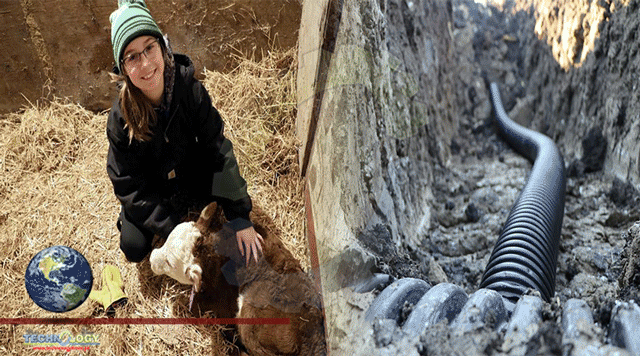More Than A Million People In The U.S. Still Lack Indoor Plumbing. Though Technologies Change, Rural Heritage Still Binds Us Together.

Field tiling once was controversial but now is common. Threshing once was preferred over combines by many farmers. More Than A Million People In The U.S. Still Lack Indoor Plumbing. Though Technologies Change, Rural Heritage Still Binds Us Together. In the distant past — if the early 1950s can be considered that — tiling was controversial. Opponents said it would ruin soil and never pay for itself. Proponents who waited out wet springs and raised stunted crops on swampy ground thought otherwise.
A retired farmer who had been among the first to tile commented that his neighbors laughed and said that he must have had money burning through his pocket since he was willing to waste it on a fool’s errand. I was thinking about that the other day when noticing a few fields that had been patterned tiled in December. Black soil appeared as windrows above the thin snow cover.
The technology that allows for December tiling stands in sharp contrast to the corn shocks seen in Amish country, which is evidence of the past. There was a time — say the prehistoric decades of the first half of the 20th century — where shocks were routinely seen in fields and not limited to retail outlets.
Dad, who fed hogs with such shocks, did not mind the era passing. The threshing machines, neighborhood crews and straw stacks remained with us until the mid-1960s, when Dad’s resistance to a tractor-driven combine ended. He always maintained that a mobile machine could not be expected to do as good a job as a finely tuned threshing machine — an opinion that was not disputed by most if not all neighbors.
There was one exception, a farmer who was among the first to purchase a Case combine. He was, Dad jested, so rich that he had a three-hole outhouse. Our own outhouse — like all the rest — was practical and not fancy. As a child, I feared that I might fall through and die. I had heard tall tales about it happening and believed them to be true.
Mischievous city kids supposedly spent Halloween nights tipping over outhouses and tipping over cows asleep while standing. A friend said that his family’s outhouse was tipped over on consecutive Halloweens; to stop the shenanigans his father waited outside with a shotgun. He never got to fire it. Our church’s outhouse stood against the tall grass and was several yards away from the hall. It still stands, although its door is boarded up after the church hall was blessed with plumbing.
The federal government reports that 630,000 households and 1.6 million people in the U.S. lack indoor plumbing. Among the states, Alaska leads the way in that regard with West Virginia just behind. A friend, who at the time was dating his future wife, said he his family lacked indoor plumbing and was embarrassed to share that news with her. You should be proud, I said, about that history.
While no child responsible for carrying a chamber pot to the outhouse on a winter day thought it good duty, it was a responsibility that future adulthood was drawing nearer. Mother never hinted at disappointment that her house lacked what many others had. It may have been inconvenient to fetch kindling and wood in winter, but the wood-burning stove helped heat the house and produced fine bread and meals at no direct expense. The good thing was, she said, though others may have considered us poor we never thought that we were. And we really were not, because Mother saw to that.
Cloth feed sacks were transformed into T-shirts and underwear with the Singer sewing machine. Her sister, on occasion, gifted Mother clothing that her own children had outgrown and that she had collected from others. Little of it would be worn without it being reworked into something different. Got to make do with what has been given and with what you have.
Field tile has helped create an agriculture more efficient than any other in history. Federal government regulations dictate how much water toilets use; and corn shocks are noticed because of their scarcity. The rural heritage that binds rural people together is alive and a source of enduring strength.
This news was originally published at AG Week.